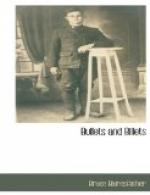It put the “wind up” me at first, but I soon got to know these affairs, and learnt to take them calmly.
I went along with the platoon commander back to his lair. An excellent fellow he was. No one in this war could have hated it all more than he did, and no one could have more conscientiously done his very best at it. Poor fellow, he was afterwards killed near Ypres.
“Well, how are things going with you?” I said.
“Oh, all right. They knocked down that same bit of parapet again to-day. I think they must imagine we’ve got a machine gun there, or something. That’s twice we’ve had to build it up this week. Have a bit of cake?”
So I had a bit of cake and left him; he going back to that old parapet again, whilst I struck off into the dark, wet field towards another gun position, falling into an unfamiliar “Johnson ’ole” on the way.
No one gets a better idea of the general lie of the position than a machine-gun officer. In those early, primitive days, when we had so few of each thing, we, of course, had few machine guns, and these had to be sprinkled about a position to the best possible advantage. The consequence was that people like myself had to cover a considerable amount of ground before our rambles in the dark each night were done.
One machine gun might be, say, in “Dead Man Farm”; another at the “Barrier” near the cross roads; whilst another couple were just at some effective spot in a trench, or in a commanding position in a shattered farm or cottage behind the front line trenches.
I would leave my dug-out as soon as it was dark and do the round of all the guns every night. Just as a sample, I will carry on from where I left the platoon commander.
I slosh across the ploughed field at what I feel to be a correct angle to bring me out on the cross roads, where, about two hundred yards away, I have another gun. I scramble across a broken gateway and an old bit of trench, and close behind come to a deep cutting into which I jump. About five yards along this I come to a machine-gun emplacement, with a machine-gun sentry on guard.
“Where’s the corporal?”
“I’m ’ere, sir,” is emitted from the slimy depths of a narrow low-roofed dug-out, and the corporal emerges, hooking back the waterproof sheet as he comes out to prevent the light showing.
“How about this gun, Corporal—is everything all right?”
“Yes, sir; but I was looking around to-day, and thought that if we was to shift the gun over there, where the dead cow is, we’d get a better field of fire.”
Meeting adjourned to inspect this valuable site from the windward side.
After a short, blood-thirsty conversation relative to the perforating of the enemy, I leave and push off into the bog again, striking out for another visit. Finally, after two hours’ visiting, floundering, bullet dodging, and star shell shirking, accompanied by a liberal allowance of “narrow squeaks,” I get back to my own bit of trench; and tobogganing down where I erroneously think the clay steps are, I at last reach my dug-out, and entering on all fours, crouch amongst the damp tobacco leaves and straw and light a cigarette.




